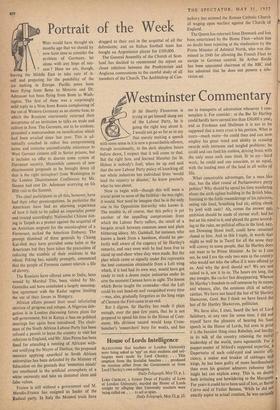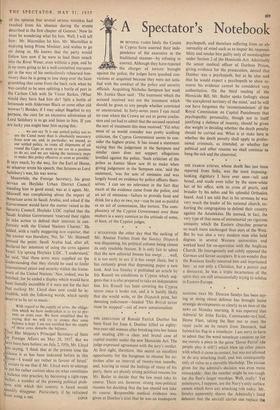Westminster Commentary
Now to begin with—though this will seem a trivial point to some of the faithful—he was right; it would. Nor need he imagine that he is the only one in the Opposition hierarchy who knows it. The trouble is, of course, that this policy is yet another of the appalling compromises from which the Labour Party suffers, the result of a bargain struck between common sense and plain blithering idiocy. Mr. Gaitskell, for instance, who knows a hawk from a handsaw, should be per- fectly well aware of the cogency of Sir Hartley's remarks, and may even wish he had been free to stand up and cheer when they were made. But the plan which came so signally under fire represents the best concession obtainable from a Left wing which, if it had had its own way, would have got ready to tuck a dozen major industries under its arm the moment Canaan hove in sight. The lesson which Bevin taught the comrades—that the Left could be met head-on and vanquished every time —was, alas, gradually forgotten as the long reign of Clement the First came to an end.
But I digress. Sir Hartley has made it plain enough, over the past few years, that he is not prepared to spend his time in the House of Com- mons. His division record would keep Cross- bencher's 'researchers' busy for weeks, and has me in transports of admiration whenever I con- template it. For consider : at the Bar Sir Hartley could hardly have earned less than £30,000 a year, and as Fordman and Shellman it is not to be supposed that a mere crust is his portion. What is more—much more—he could then and can now employ his great mind and ability in crossing swords with immense and tangled problems; he could and can feed•his restless, driving brain with the only meat such men think fit to eat—hard work; he could and can associate, as an equal, with the leading men of the land in all walks of life.
What conceivable advantages, for a man like that, has the idiot round of Parliamentary party politics? Why should he spend his time wandering about the sixth ugliest building in the British Isles, listening to the futile maunderings of his inferiors, eating vile food, breathing bad air, sitting cheek by jowl with cads? Ah, comes the answer part, ambition should be made of sterner stuff; had he but set his mind to it, and played the game accord- ing to the rules, no political office in the land, nay, not Downing Street itself, could have remained closed to him. And to this I reply, in words that might as well be in Tamil for all the sense they will convey to some people, that Sir Hartley does not want to be Prime Minister. As far as I can see, he and I are the only two men in the country who would not take the office if it were offered to us. And why the devil should we? We are not suited to it, nor it to us. The hours are long, the pay meagre, the cachet fast disappearing. Whence Sir Hartley's freedom to call nonsense by its name, and whence, also, the ominous click of safety- catehes. We have not heard the last of Sir Hartley Shawcross, Gent. But I think we have heard the last of Sir Hartley Shawcross, politician.
We have also, I trust, heard the last of Lord Salisbury, at any rate for some time. 1 did not myself have the pleasure of hearing his SueZ speech in the House of Lords, but even in print it is the funniest thing since Rabelais, and hardly, in its talk of the country retaining the moral leadership of the world, more squeamish. For 0 puppet-master of Milord's supposed expertise, Dapertutto of such colds-eyed and sinister etll• ciency, a maker and breaker of cabbages and kings, he has been guilty of more hamfistedneis than even his greatest admirers (whoever they might be) can explain away. This is, no doubt, both irritating and bewildering to the Marquess. •- For years it could have been said of hini, as Baron Corvo said of Father Benson, 'While he did not exactly aspire to actual creation, he was certainly of the opinion that several serious mistakes had resulted from his absence during the events described in the first chapter of Genesis.' Now he must be wondering what hit him. Well, I will tell him : Mr. Macmillan hit him. Mr. Macmillan is enjoying being Prime Minister, and wishes to go on doing so. He knows that the party would follow him now if he were to lead them smack into the River Weser, even without a pipe, and he is no more going to let a well-connected marquess get in the way of his meticulously rehearsed bon- vivery than he is going to lose sleep over the faint grumbling that came from the back rank when he was careful to be seen splitting a bottle of port in the Carlton Club with Sir Victor Raikes. (What would they have had him do? Split a bottle of lemonade with Alderman Black or some other old wowser?) Besides, if I may adapt Bagehot to my purpose, the cure for an excessive admiration of Lord Salisbury is to go and listen to him. If you are lucky you might hear him saying this : . . . we can say 'It is our settled policy not to
use the Canal more than is absolutely necessary from now on, and, in particular, we intend, as our settled policy, to route all shipments of oil round the Cape as soon as we arc in a position to do so; and we are taking the necessary steps to make this policy effective as soon as possible.'
It says much, by the way, for the Earl of Home, or whoever wrote his speech, that fatuous as Lord Salisbury's was, his was worse.
Meanwhile, the Foreign Secretary, his great service on Hoylake Urban District Council standing him in good stead, was at it again. Mr. 'Shinwell was complaining about the export of 'American arms to Saudi Arabia, and asked if the 'Government would have the matter raised in the Security Council. Hoylake UDC replied that the 'Saudi Arabian Government 'reserved their rights ‘to take action to defend their interests in con- 'formity with the United Nations Charter.' He added, with a really staggering non sequitur, that 'the answer was therefore, 'No, Sir.' Mr. Shinwell pressed the point; Saudi Arabia had, after all, ;declared her intention of using the arms against Israel. Up sprang Hoylake UDC..`1 understand,' Ile said 'that these arms were supplied on the c, understanding that they should be used to foster international peace and security within the frame- work of the United Nations.' Nor, indeed, was he finished; for he ended a display which would have been literally incredible if it were not for the fact that nothing Mr. Lloyd does now could be in- credible, with the following words, which surely deserve to be set to music : With regard to the,supply of arms, the obliga- tion which we have undertaken is to try to pre- vent an arms race. We have amplified that by saying that we will try to ensure that some balance is kept. 1 am not satisfied that the supply of these arms disturbs the balance.
r i 'hus Her Majesty's Principal Secretary of State or Foreign Affairs on May 28, 1957. But we ave been here before; on July 2, 1956, Mr. Lloyd ,as saying, 'I think that at the present time the IISlance is as has been indicated before in this ti Ouse—I would say rather in favour of Israel.' 4 occurs to me that if Mr. Lloyd were to attempt to put his rather curious ideas on what constitutes a balance into practice, by becoming a tight-rope Walker, a number of the pressing political prob- lems with which this country is faced would speedily disappear. Particularly if he refrained











































 Previous page
Previous page